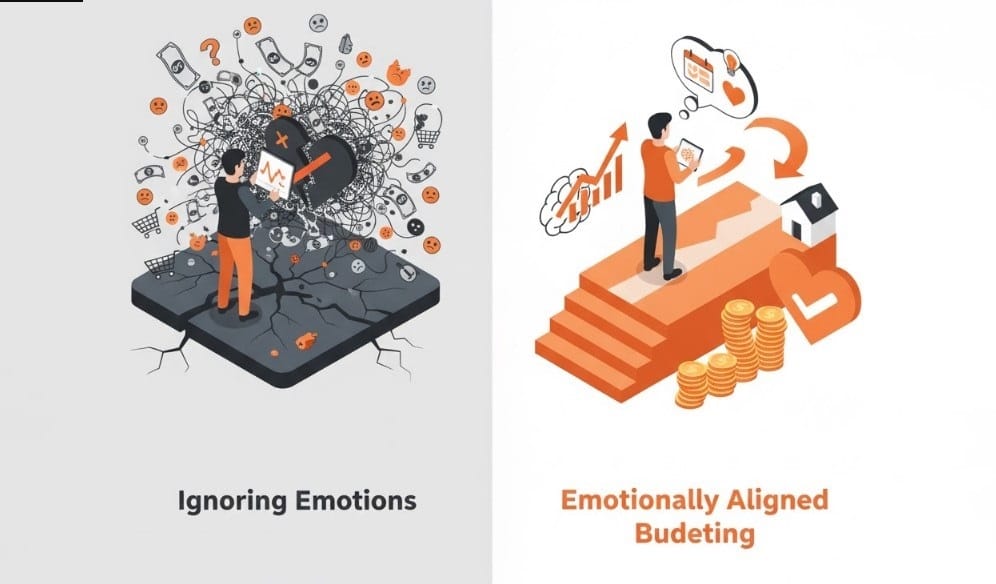Most budgeting guides focus on numbers, categories, and spreadsheets — but rarely on feelings.
Ignoring emotions is one of the main reasons budgets fail.
Spending isn’t purely rational. Our choices are often driven by stress, reward, fear, or habit. When budgeting ignores these triggers, it sets you up for frustration, guilt, and eventual abandonment.
1. Emotional Spending Sabotages Budgets
Emotional triggers include:
- Stress or Anxiety: Buying as a coping mechanism
- Rewarding Yourself: Overspending after work or achievements
- Boredom: Shopping to fill empty time
- Social Comparison: Buying to match peers or trends
When these emotions aren’t acknowledged, strict budgets feel restrictive, and impulse purchases break them.
2. Scarcity Mindset Creates Pressure
Treating budgets as rigid rules can trigger fear and scarcity thinking:
- “I can’t spend anything, or I’ll fail”
- Minor overspending leads to giving up entirely
- Anxiety about money increases emotional spending
The result? A vicious cycle of guilt, stress, and budgeting failure.
3. Budgets Ignore Psychological Needs
Budgets often neglect:
- Freedom: Lack of discretionary spending leads to rebellion
- Reward: No recognition for small wins reduces motivation
- Values Alignment: Spending that doesn’t match priorities creates dissatisfaction
When budgets feel emotionally incompatible, sticking to them becomes impossible.
4. The Role of Habit Formation
Budgeting isn’t just planning; it’s creating habits:
- Tracking expenses consistently
- Reviewing progress regularly
- Automating savings and payments
Without habits that integrate emotion and behavior, even the most logical budget fails.
5. How to Make Budgets Emotionally Intelligent
- Track emotional triggers: Note feelings when spending
- Build flexibility: Include discretionary funds for enjoyment
- Set realistic goals: Focus on progress, not perfection
- Celebrate milestones: Reward yourself for consistent saving
- Reframe negative emotions: Turn guilt or fear into constructive awareness
This approach ensures your budget works with your mindset, not against it.
6. Align Money With Mindset
Emotional awareness transforms budgeting from a restrictive task into a growth tool:
- Reduces overspending from stress or comparison
- Builds sustainable financial habits
- Improves self-awareness and decision-making
- Creates long-term financial confidence
When your budget respects your emotions, it stops being a constraint and becomes a partner in financial freedom.
Conclusion
Ignoring emotions is the silent reason most budgets fail.
By integrating emotional awareness, flexibility, and habit formation, you can create a budget that:
- Reflects your values
- Supports your mindset
- Enables long-term financial success
Budgeting isn’t just numbers — it’s psychology in action.


